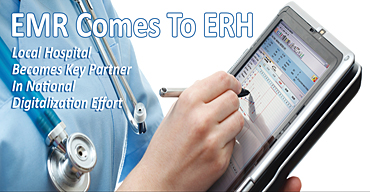Serving the Towns of Wawarsing, Crawford, Mamakating, Rochester and Shawangunk, and everything in between | |||
| |||
|
Read how you can help!
EMR Comes To ERH
Local Hospital Becomes Key Partner In National Digitalization Effort
ELLENVILLE – There's a revolution underway in health care data storage and access, and it promises to shake up the way hospitals do business all across the country. And though it concerns data collection and storage, not some new wonder drug, it will affect our interactions with doctors and their back up staff in very positive ways. The revolution comes from Athena Health, a giant, fast growing data networking company. And here is little Ellenville Regional Hospital, which has been making a name for itself in national health circles for some time now, right in the forefront of this revolution. ERH has been selected as just one of four hospitals to be a test bed for a new way of collecting and storing patient data. CEO Steve Kelley of Ellenville Regional Hospital finds himself in the avant garde of this change, which he promises will soon sweep through the nation's medical industry. The revolution stems from Athena Health's new product, which Kelley points to as a "disruptor" technology. "It's like working with Apple when they were developing the iPhone. That changed how we think about phones, this will change the way health care records are stored," he said. "And with that the whole cost structure will change, too." They're talking about software that will take medical records and store them in "the cloud," making them accessible to patients wherever they seek medical care. That's done already to some extent, of course. In the medical records field, Epic is the IBM — the 500 pound gorilla, with a business model that is both highly profitable and thirty years old. In that model Epic controls everything and charges plenty for its services in much the same way that IBM once controlled business software which ran on its mainframe computers, and charged accordingly. That business model tumbled as the personal computer and Microsoft Windows marched onto the scene. Kelley, well known as a "numbers guy" whose efforts have helped the regional hospital's turnaround and blossoming, noted how ERH's prominence caught the attention of Athena executives. Or as Bob Looney, director of account management at Athena Health, put it, "We want to partner with ERH because they're a leader in their space." Indeed, it's true. Ellenville Regional has become a nationally known example of a small "critical access hospital" that has found a successful way to do business. "There are a thousand or more hospitals across the US that look like ERH, the facilities we're hoping to serve," Looney added. "ERH have become a very viable institution in their community, and are now looking for help to lower costs." You lower those costs, the Athena Health rep said, by saving time for both doctors and support staff. "What our product does is let doctors be doctors," Looney said. "We cut down the paperwork time for everyone." ERH's Ashima Butler, project leader for the hospital's electronic medical records' upgrade, noted that "it's very important to know that this helps everyone, not just the doctors. It streamlines the process so clinical and non-clinical workers are on the same platform, feeding information into the system. It's much more than just a physician component." What about security in this age of hacking, Russian and otherwise? "There's a secure log-in, and all data is encrypted. It's not easily hackable at all," Butler replied. "We are going live with this on February 1st, and training commences this week... This is a very streamlined product. It helps put the necessary data at the fingertips of health providers and lets them make decisions and not get bogged down in data entry." For the big picture, Bob Looney explained, "We will get ERH on our network and connect their patients to the network." That network has 80,000 other providers who use the system to document everything from visits to an emergency room and diagnoses to lab work and prescriptions. "We will help ensure connectivity across all those nodes to other health providers in their region," Looney added. So, no longer will you have to get medical records faxed to another hospital or doctor's office. The information will be available in the cloud, pretty much accessible anywhere, via Athena. "End result," concluded Looney, "is more facetime for the patient with the doctor and less paper work." Back to Steve Kelley at the hospital itself. "This is a lot less expensive than the current model," he said, enthusiastically. "It's really the first new product in the field in 25 to 30 years. This is truly a game changing innovation."
Copyright © 2017, Electric Valley Media LLC | Terms of Use
All Rights Reserved. |
|
|||||||||||||||||||||||||||||||||




